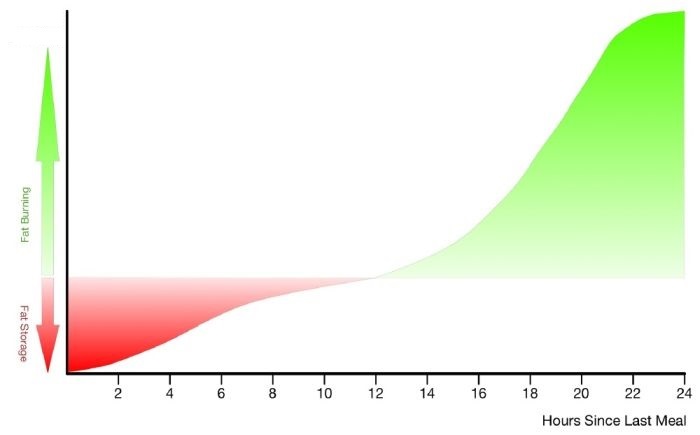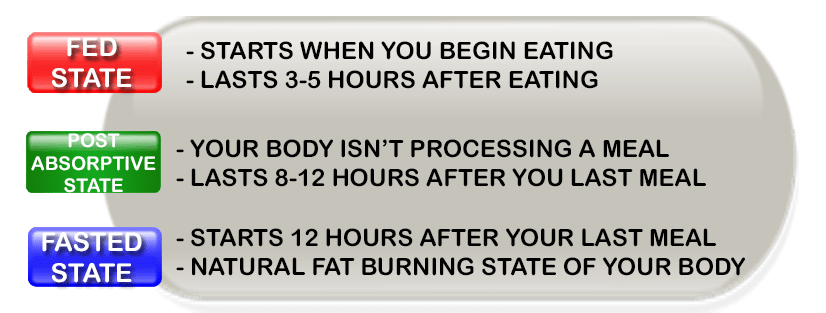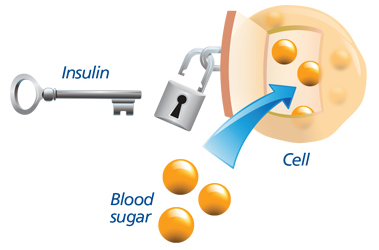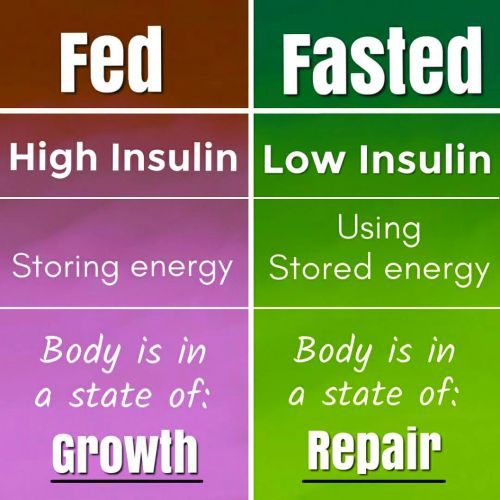When you eat food, you give the body relatively large amounts of energy in a short period of time. Part of this energy is burnt, and some is stored in the form of fat for further use. In our body, there are two main energy storage facilities the excess calories, eaten during the day, are sent to: fat and glycogen. First of all, the organism uses glucose (your buns and sweets), which is in the blood after eating. When all the reserves of glucose are exhausted, the organism uses glycogen. When all the reserves of glycogen are exhausted, the organism uses fat. Immediately after eating, fat burning does not occur, because the body is in the regime of retaining fat deposits. The reason for this is simple: why should the body burn fat for energy production, if you have provided that energy in the required quantity (and even more) in your recent meal? The metabolic state, in which energy is extracted from glucose in the blood (the source of which is the just eaten food), and the excess is deposited as fat, is called glycolysis (carbohydrates breakdown).
After several hours, the body completes the digestion and absorption of food, and goes into the "post-absorptive" state. The energy obtained from food is over, but the organism must continue to function. What can the body do to meet its energy needs? That's right - it can burn fat. The body cannot function without energy, so now it is forced to go into the fat burning regime to work until the next meal comes. There is a transition from glycolysis to the opposite state, called lipolysis (fat breakdown), or ketosis (strictly speaking, they are not the same thing, but let's not complicate it - only the term "ketosis" is widely used anyway). Now most of the energy is provided by the cleavage of fats previously accumulated in the body, fatty acids and ketones (aka ketone bodies).
The same facts but looking at the clock
To process the eaten food, your body needs appr. 3-5 hours depending on what and how much you have eaten. During that time, no fat burning occurs: the food is the supplier of energy because it is a much more readily available source of energy compared to stored fat. So, the transition from external sources of energy to internal fuel stores starts 3-5 hours after eating, and keeps gaining momentum.
The main process of fat burning begins about 12 hours after eating, when the burning of all carbohydrates obtained with this food is completed:

Let's summarize:

What does all that mean?
None of us ever begin to seriously burn fat for energy, as we are constantly eating something and snacking - from the moment we wake up until going to sleep. Think about that: in the morning we always have breakfast just at the very moment when those 12 hours without the food have passed, and the fat burning process was about to start working to its fullest!
That's why we cannot lose weight.
Insulin plays a very important role in this game

From Wikipedia: In glycolysis, higher levels of insulin promote storage of body fat and block release of fat from adipose tissues, while in ketosis, fat reserves are readily released and consumed. For this reason, ketosis is sometimes referred to as the body's "fat burning" mode.
From My single best weight-loss tip: In your body, nothing happens by accident. Every single physiologic process is a tight orchestration of hormonal signals. Whether our heart beats faster or slower is tightly controlled by hormones. Whether we urinate a lot or a little is tightly controlled by hormones. Whether the calories we eat are burned as energy or stored as body fat is also tightly controlled by hormones. So, the main problem of obesity is not the calories we eat, but how they are spent. And the main hormone we need to know about is insulin. Insulin is a fat-storing hormone. There's nothing wrong with that – that is simply its job. When we eat, insulin goes up, signaling the body to store some food energy as body fat. When we don't eat, then insulin goes down, signaling the body to burn this stored energy (body fat). Higher than usual insulin levels tell our body to store more food energy as body fat.
From Why Fast? Part One – Weight Loss: Fasting decreases fasting insulin levels. The presence of insulin inhibits lipolysis, the release of stored triglycerides (body fat). Without lipolysis actually releasing stored body fat, it's rather difficult to, well, burn that body fat for energy. During a fast, fasting insulin decreases and lipolysis increases. This insulin-blunting aspect of fasting quite literally allows the fast to be successful, because without the ability to access stored body fat for energy, making it through a period of zero caloric intake will be nigh impossible.
From The sugar conspiracy | The Guardian: Far from being an inert dumping ground for excess calories, fat tissue operates as a reserve energy supply for the body. Its calories are called upon when glucose is running low – that is, between meals, or during fasts and famines. Fat takes instruction from insulin, the hormone responsible for regulating blood sugar. When insulin levels rise, fat tissue gets a signal to suck energy out of the blood, and to stop releasing it. So when insulin stays high for unnaturally long, a person gains weight, gets hungrier, and feels fatigued.
From Dr Fung's article What and when to eat to reduce insulin: Here's a startling truth. I can make you fat. Actually, I can make anybody fat. How? I simply prescribe insulin injections. Giving people extra insulin inevitably leads to weight gain. In type 1 diabetes, when insulin levels are extremely low, patients lose weight no matter how many calories they eat. Give insulin – gain weight. No insulin – lose weight (even to the point of death). The implication is clear. Insulin causes weight gain. Knowing this is crucial, because if insulin causes weight gain, then losing weight depends upon lowering insulin. But instead, we've been told to focus obsessively on calories. he standard (failed) weight loss advice is to restrict a few calories every day by reducing dietary fat and eating multiple times per day. This does not lower insulin much since dietary fat has little insulin effect and eating frequently constantly stimulates insulin secretion. This ‘caloric reduction as primary' advice has an estimated failure rate of 99.5%. So, if you have tried calorie restriction to lose weight and failed, understand this. You were expected to fail. So here's the situation. ‘The Man' tells you that obesity is a caloric balance and that you should eat less and move more. ‘The Man' tells you to eat a low-fat diet, and to eat 10 times a day. This advice fails virtually everybody. When you fail, ‘The Man' tells you it's your own damned fault for being such a lazy-assed, floppy-willed person. His advice was good, ‘The Man' tells you. You were just a failure. That's what ‘The Man' wants you to believe. Imagine, though we have a classroom of 100 pupils. One fails. It's likely his fault. Maybe he played too many video games. But if 99 students fails, then it's not a problem with the students. The problem is with the teacher. In obesity, the problem of rampant obesity means that it is very obviously not the fault of the people. The fault lies with the official dietary advice. Understanding that obesity is a hormonal disorder, not a caloric imbalance means that we must instead focus on the insulin effect rather than the number of calories to successfully lose weight.
To practice Intermittent Fasting, you do not need to plunge into the abyss of medical knowledge, but the following two facts should be carved in your mind as in a stone:
- Any food intake leads to an insulin spike. The higher the level of insulin, the more fat is stored:
FOOD > INSULIN INCREASING > KETOSIS REDUCTION > FAT STORAGE
What does it mean practically? Even the most insignificant snack interrupts fasting. - When we do not eat (fast), insulin falls, causing the opposite effect. The spike from the previous meal gradually subsides back down to the background level. The lower the level of insulin, the more the stored fat is burned:
FASTING > INSULIN REDUCTION > KETOSIS INCREASING > FAT BURNING

From the site of Harvard Medical School:The food we eat is broken down by enzymes in our gut and eventually ends up as molecules in our bloodstream. Carbohydrates, particularly sugars and refined grains (think white flours and rice), are quickly broken down into sugar, which our cells use for energy. If our cells don't use it all, we store it in our fat cells as, well, fat. But sugar can only enter our cells with insulin, a hormone made in the pancreas. Insulin brings sugar into the fat cells and keeps it there.
Between meals, as long as we don't snack, our insulin levels will go down and our fat cells can then release their stored sugar, to be used as energy. We lose weight if we let our insulin levels go down. The entire idea of IF is to allow the insulin levels to go down far enough and for long enough that we burn off our fat.
From Why Fasting Succeeds Where Caloric Restriction Fails:The key to successful long-term weight loss is not reducing calories. It's reducing insulin, because insulin is the switch that decides whether your body is burning food energy or stored food energy (body fat). If you are burning food, then you are not burning fat. It's as simple as that. The key to accessing your body fat stores is to reduce insulin. You must let your body go into the ‘fasted' state. The key to weight loss (for most people) is not to reduce calories. The key is to reduce insulin - to switch tracks.
The next video is very short (2 min 40 sec), but very important:
3 MEALS A DAY (EVEN WITH NO SNACKS) - NOT A GOOD IDEA
The following graph shows the phases of fat accumulation and burning in the usual "classic" 3-meals a day lifestyle - even without snacks between the meals:
Once you begin to burn fat, the process is almost immediately interrupted by the next meal:

5-6 MEALS A DAY (MAIN MEALS + SNACKS) - VERY HARMFUL PRACTICE
If you add snacks between the main meals or simply eat 5-6 times a day as most health specialists suggest, your body is accumulating fat during the whole day. Often, new food comes even before the previous meal has been digested - a non-stop conveyor of building material for your ass!
The fat burning stage is not even reached - you give it no chance to start because you excrete insulin all the time:

One of the most common myths of "proper nutrition" is: 5-6 small meals a day is the right solution ("To keep your metabolism revving, you should eat snacks every once a while!"). The logical chain seems flawless: small portions - a small amount of food - losing weight. Ask any doctor, nutritionist or wellness trainer; almost everybody will repeat this mantra. Well, not even a mantra – it is a truth beyond question! You want to lose some weight, to live a healthy life? Eat every 2-3 hours, and this will presumably melt down extra pounds of your body weight. In fact, my friends, eating many times a day in order to speed up your metabolism and slim down is nothing but a myth – an obsolete one.
From My single best weight-loss tip:
Don't eat all the time.
Unfortunately, most nutritional authorities tell you the exact opposite. Eat six times a day. Eat lots of snacks. Eat before you go to bed. Eat, eat, eat – even to lose weight! It sounds pretty stupid, because it is pretty stupid. Instead, it may be better to use intermittent fasting, a dietary technique used successfully for countless generations.Let's debunk two popular arguments of supporters of multiple meals per day.
Argument #1:
"You should not skip meals, because that will make your body think it's starving, and it will start storing fat like crazy in order to survive the period of famine - this is an evolutionary mechanism that allows living beings to survive!"
In reality:
Quite the opposite! Energy reserves are being accumulated "for a rainy day" in "good times" (when food is plentifully supplied), and spent in "bad times" (when the body is starving). Actually, the energy is accumulated in order to be available during the fasting period. Nature has provided fat as an emergency source of energy. That is why excess nutrition is deposited as fat - our ancestors obtained food rarely, but obtained a lot. When a mammoth was slaughtered and eaten, part of the energy was stored in fat, in order to maintain the body until the next prey. How could it be otherwise? How can energy be accumulated during the period of hunger, if it does not enter the body? Where does energy come from - from the air? This is the same as saying: the smartphone is being charged when you are speaking on it walking on the street, and not charged when connected to the charger.
Argument #1:
"If you do not eat for a few hours, you feel severe hunger and eat more than you need!"
In reality:
This is so only for a person who eats many times a day, especially high-carbohydrate foods. I.e. a person who is NOT in ketosis. When, a few days after the start of Intermittent Fasting (and carbohydrates removal), you enter ketosis, you will feel hungry very-very rarely; the hunger will be very weak, and you will get rid of it easily (how? ok, you will read about that in the page KETOSIS AND HUNGER).
2 MEALS A DAY
Well, here we come to the Intermittent Fasting! The most popular and easiest protocol is "16:8". That means: 2 meals during the day must fit into the 8-hour "eating window", and in the remaining 16-hour period of "fasting" only beverages without calories are allowed (water, tea, coffee - anything without milk, cream, sugar and other calories). Those 16 hours are enough to consume glycogen and start burning fat. This is the essence of Intermittent Fasting. So, you simply remove breakfasts, and your new life has begun!
Yes, yes, I know that your doctor says: "Breakfast is the most important meal of the day!"... But he/she is simply wrong. Unfortunately this is terrible advice. When you first wake up in the morning, your insulin level is quite low and most people are just starting to enter the fasted state, 12 hours after eating the last meal of the previous day. The worst thing you could do is to eat food, spiking insulin and glucose and immediately shutting off fat-burning. A much better choice would be to push the first meal of your day out at least a few hours, during which you can fully enter the fasted state and burn stored body fat. The VERY WORST would be to eat a high carbohydrate breakfast, spiking insulin and glucose as high as possible; in addition to shutting off fat-burning for likely 12 hours, this will drive as many calories as possible into fat stores as well as providing further reinforcement of the burning of glucose rather than fat (fucking bagels, wafers, jam and sweet yogurt in hotels' "continental breakfasts"!). Also, high spikes of insulin and glucose always lead to large drops in glucose a few hours later, which triggers HUNGER (if you want to have hypoglycemia or low blood sugar and ravenous hunger, just eat a breakfast of pure carbohydrates and then wait 2-3 hours to see how you feel: you will be ready to eat the whole world!). Also, as you can read on the page HOW TO START, skipping breakfast prolongs the effect of growth hormone, produced nightly, which plays an important role in weight loss - it "opens the fat depot" i.e. enables the use of fat deposits as a source of energy. This hormone "acts" not only in the second half of the night (when it is being produced), but also for several hours (up to 7-8!) after you have awaken. But only until the moment you eat!
Very soon, when you will be adapted to burn fat (following the instructions on this site), you will not be hungry in the morning, so you will need zero will power to skip breakfast.
Now, when you eat twice a day, much more time is devoted to fat burning:

Your "eating window" can be noon to 8PM (the most popular schedule), 11AM to 7PM, 1PM to 9PM - whatever. My son (who has lost a loooot of weight eating twice a day) prefers to skip dinner, but most people feel more comfortable to skip breakfast.
The shorter the "eating window", the better!
The logic is simple: since all the "work" to make you slim and healthy is done by the fasting stage, the "eating window" is useless from that viewpoint. So, it makes sense to make that window as short as possible. 8 hours is the maximum allowed, but if you decrease it to 6 hours (the "18:6" protocol), then your efforts will be much more effective, since 2 more hours will be dedicated to fat burning every day. Try the window from noon to 6 PM. It's easy: you simply skip breakfast (like in "16:8"), but eat dinner 2 hours earlier. Even doing that, after the dinner, you don't have enough time to become hungry before going to sleep.
A little bit later, it's even possible to do a 4 hours eating window ("20:4"). You might say: "How can I have 2 meals in 4 hours? I will not be hungry so soon after the first meal, especially when I am in deep ketosis!". That's true. However, you can have a snack some time after the meal (of course, I am talking about a healthy snack like cheese, smoked rib or some nuts or seeds - not about wrapped bars from the store, full of poison). You will do that only if you really want to... But the most amazing thing is that you will not want in most days! In fact, I eat additional food after the main meal only sometimes. Usually, I feel full for long time after my only daily meal. What I practice in most days, is very similar to "20:4". In the Intermittent Fasting community it is called OMAD –
ONE MEAL A DAY
This option is the most effective variant of IF (except of ADF [Alternate-Day Fasting] - eating each other day; I don't practice it, and I don't recommend it in the first time - maybe later, if you will stop losing weight before achieving the ideal BMI, and find this method comfortable). Your body turns into a fat burning machine!
Fat is being burned throughout almost the entire day:

I switched to OMAD on the 6th day after starting IF. That was not planned in advance - I just did not want to eat (why should I force myself?).
There are people who still count calories, trying to be in the deficit (i.e. to consume less calories than they spend) - even on IF. But on OMAD it's meaningless at all. Why? Because it's very difficult (almost impossible) to consume so many calories in one meal, even if you would like to!
Warning. OMAD can lead to a "diet trap," so do not rush to switch to it. See paragraph 12 of HOW TO START.
